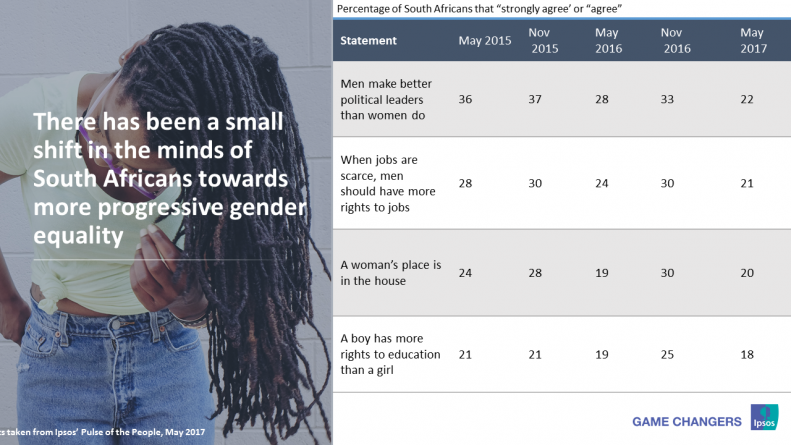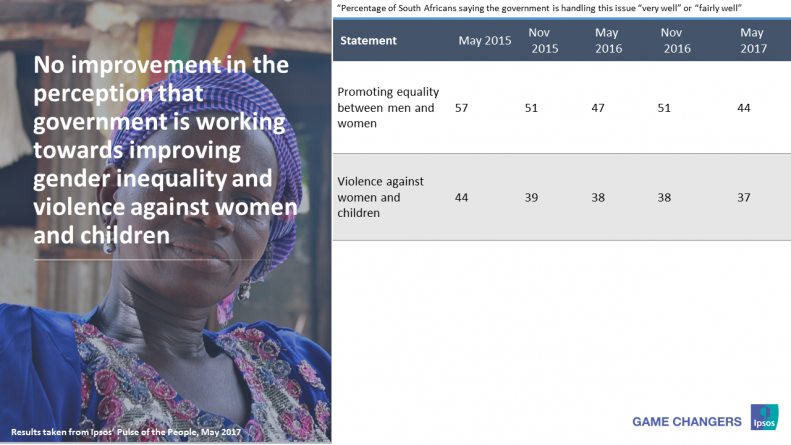Polls show some improvements in South African perceptions of women
Looking at the history of perception tracking in society, Ipsos has uncovered recent improvements in the overall perceptions of women and the role of women in South Africa.
If we look at the opinions held in May 2015 as opposed to May 2017 it seems as if the constitutional principle of equality is making some inroads:
- In May 2015 more than a third (36%) of adult South Africans thought that men make better political leaders than women do – this is now down to 22%;
- Almost three in every ten (28%) believed that when jobs are scarce, men should have more rights to jobs than women – this is now down to two in every ten (21%);
- Roughly a quarter (24%) held the opinion that a woman’s place is in the house – this is now down to a fifth (20%);
- 21% believed that a boy has more rights to education than a girl – this is now marginally down to 18%.
These beliefs are held by both men and women, however, in all cases the proportion of women saying that they “strongly agree” or “agree” with these notions are lower than the proportion of men who hold the same opinions.
“These views are undoubtedly the result of many years of living in an unequal society” says Mari Harris, Head of Ipsos Public Affairs and Political Analyst. “Our paternalistic society and ideas embedded by culture and custom lead to the view that women are somehow less worthy than men. These beliefs and others perpetuate social, economic and political inequality between the sexes. It is encouraging to see some improvement in these perceptions at last, as the results from May 2017 indicate a small shift in the minds of South Africans towards a more progressive outlook about gender equality and more specifically about women’s place in society.”

In the same survey respondents are asked about the efficiency of government efforts in the fight for gender equality. The government of South Africa plays a key role in addressing gender equality and the formulation and execution of policies to prevent violence against women and children.
However, the perceived success of the government’s efforts in this regard are viewed rather dimly[1]:
- In May 2015 almost six in ten South Africans (57%) thought the government was doing well in this aspect – in May 2017, only just more than four in ten (44%) think that the government is doing a good job here;
- As far as the handling of violence against women and children is concerned, we see the same trend, the current evaluation of the government’s success in this regard is 7 percentage points lower than two years ago. Currently only 14% think that the government is handling this issue “very well” – it is rather interesting that there is no difference between the opinions of women and men on this issue. Younger people feel a lot less confident than older people in the ability of the government to address this social ill.

Technical Detail
The Khayabus study was conducted from 21 April to 22 May 2017. A total of 3,598 South Africans, 15 years and older, were interviewed. They were randomly selected and interviewed face-to-face in their homes and home languages. Interviews were conducted all over the country, from metropolitan areas to deep rural areas. This methodology ensured that the results are representative of the views of the universe and that findings can be weighted and projected to the universe – i.e. South Africans 15 years and older.
Trained quantitative fieldworkers from all population groups were responsible for the interviewing and CAPI (Computer-Assisted Personal Interviewing) was used. All results were collated and analysed in an aggregate format to protect the identity and confidentiality of respondents.
All sample surveys are subject to a margin of error, determined by sample size, sampling methodology and response rate. The sample error for this sample at a 95% confidence level is a maximum of 1.63%.
[1] Public reaction after the assault allegations against deputy minister of Higher Education Mduduzi Manana also made this view about government’s role very clear.




